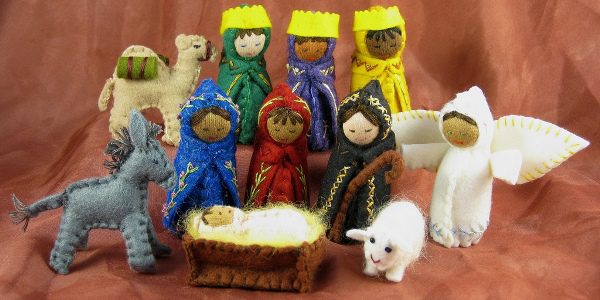
God cannot be a baby. That’s a scandal. Because babies are not omnipotent. They’re not dispassionate unmoved movers. Plus to be a baby requires spending time in the womb of a human mother completely contingent upon her for survival which is completely not how an eternal being subsists. That’s what ruffled the feathers of Nestorius, the fourth century archbishop of Constantinople. He was deeply uncomfortable with an ancient hymn that referred to Mary as the “God-bearer.” He said the hymn could be fixed by simply calling Mary the “Christ-bearer” instead. Nestorius was condemned as a heretic by the Council of Chalcedon. But he would be perfectly at home today among American Protestant Christians, who are functionally Nestorian.
We say in all our creeds that Jesus is divine, but we know he’s not actually God because “God” is the name that we use for the first member of the Trinity. It’s God, Jesus, and the Holy Spirit, particularly in an age when Father, Son, and Holy Spirit feels too patriarchal to say. What scandalized Nestorius would never scandalize us because we know better than to say that the creator of the universe shat himself while lying in swaddling clothes in a filthy manger. And we would never call Mary the “mother of God” because that sounds too much like we’re idolizing Mary. The way that we overcome the scandal of a baby God is to say that Jesus was “born to die” so that our sin could be canceled out in the ledger book of the stoic, transcendent one who is really our God.
Jesus can be born of a human mother as long as God (i.e. his Father) is the one who remains in complete control and perfect transcendence. What becomes uncomfortably messy is if Jesus is somehow actually revealing God’s true nature when he’s covered in undignified filth. How can a God who becomes a helpless baby also be the omnipotent creator of the universe who holds everything together? There are ways of making it work logically. The Council of Chalcedon said that Jesus has a human and divine nature which are both indivisible and distinct, “the distinction of natures being by no means taken away by the union, but rather the property of each nature being preserved.” I have no quarrel with orthodox christology, but when it “resolves” the scandal of Jesus’ incarnation, it robs us of the gospel and leaves us with a radically diminished understanding of salvation.
Jesus’ manger saves us from our sin no less than his cross does. Because Jesus saves us from our sin by becoming one with the people who are crushed by our worldly systems of sin. His manger and his cross together declare his solidarity with the people whose suffering we don’t care about. Thomas Merton puts it this way in his book Raids on the Unspeakable.
Into this world, this demented inn, in which there is absolutely no room for Him at all, Christ has come uninvited. But because He cannot be at home in it, because He is out of place in it, and yet He must be in it, His place is with those others for whom there is no room. His place is with those who do not belong, who are rejected by power because they are regarded as weak, those who are discredited, who are denied the status of persons, tortured, exterminated. With those for whom there is no room, Christ is present in the world. He is mysteriously present in those for whom there seems to be nothing but the world at its worst… It is in these that He hides Himself, for whom there is no room. [72-73]
Jesus’ salvation is his solidarity with those for whom there is no room in a sinful, selfish world that crushes them. This is the side of the story that privileged Christians are unwilling to be scandalized by. We have whitewashed the scandal out of the story with our “Silent Night” candle vigils. Jesus shows us God’s true nature by taking his place “with those others for whom there is no room.” As we read through the gospels about Jesus’ deeds, interrupting worship in the synagogue to heal on the Sabbath, eating and drinking with unclean tax collectors, praising a prostitute for showing greater hospitality than the host of a dinner party, what we learn is that the way to gain communion with God is not to build barbed wire fences around his table so that nothing impure will enter into his presence, but to get our hands dirty loving and welcoming people whom the world has deemed unclean. In fact, Jesus calls us “whitewashed tombs” when we attempt to leverage our way into heaven through our moral purity.
Who are the people in our world that “do not belong,” who are “discredited” and “denied the status of persons”? Those are the people to whom the manger baby calls us to show our solidarity. The salvation of Christmas is their triumph and vindication.
If you’d like an opportunity to share your Christmas generosity and get in a tax-deductible donation before the end of the year, please consider supporting our campus ministry NOLA Wesley, which is thriving in every way except financially. We have raised $4175 out of the $10,000 we need to raise to pay our bills and our staff by the end of the year. You can support our year-end fundraising drive or help us achieve long-term sustainability by becoming a monthly patron.












